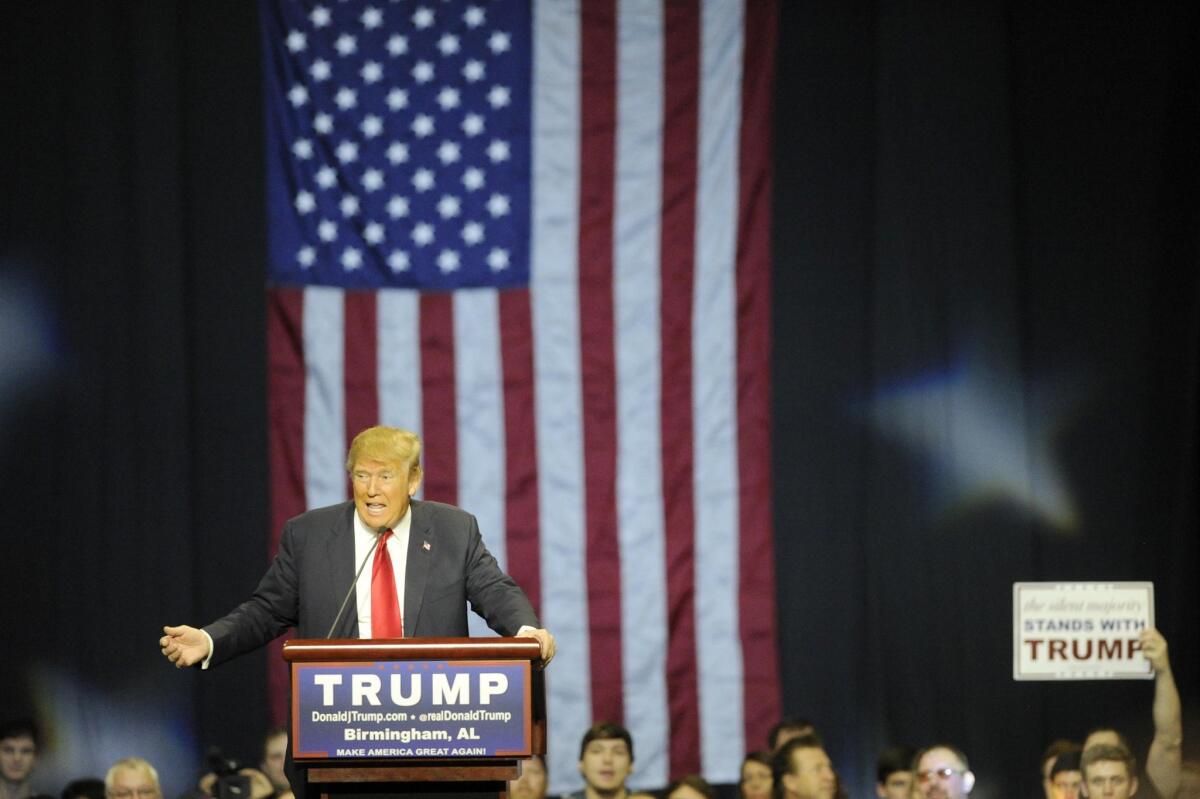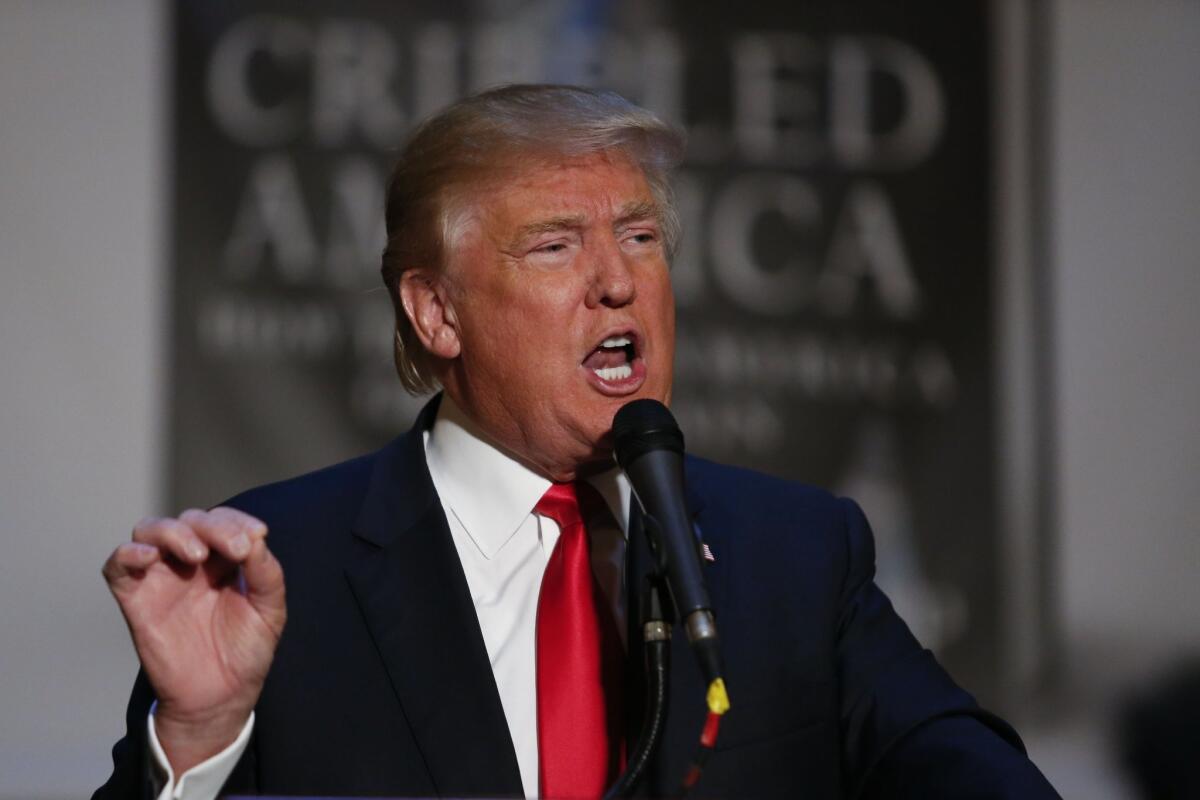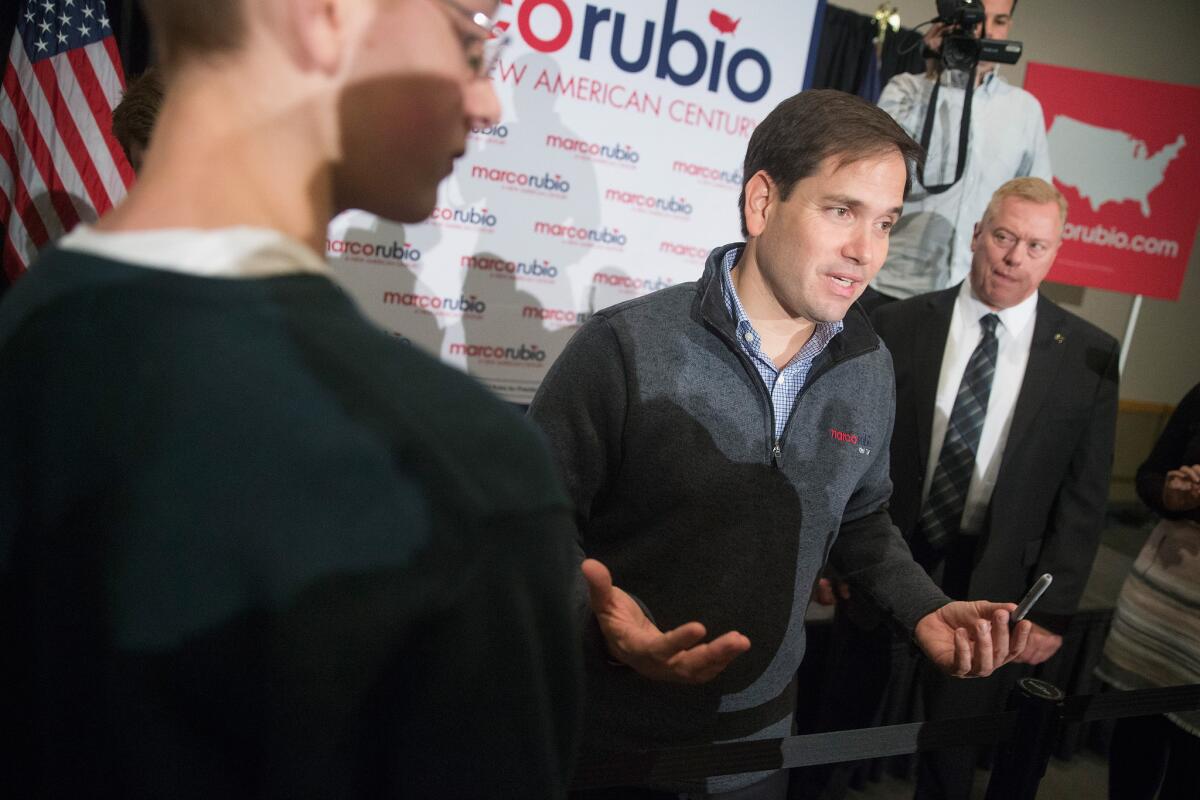Donald Trump does well in poll with Americans who are ‘angry’ with the government
- Share via
By the numbers
Welcome to Trail Guide, your host through the wilds of the 2016 presidential campaign. It's Monday, Nov. 23, and here's what we're talking about:
- A poll shows Americans' healthy distrust of Washington, though they're likely to support certain government programs.
- Is Marco Rubio positioning himself so far to the right on issues like immigration that it could hurt him in a general election? The Times' Michael Finnegan and Kurtis Lee report from Colorado.
- Donald Trump said waterboarding should be used in the fight against Islamic State.
- Rubio supports a bill in Congress that would ban Syrian refugees from coming to the United States.
- Stay up-to-date on the 2016 presidential field.
Americans not wanting refugees -- an old tradition

Syrians rest after their arrival on the Greek island of Lesbos. American political backlash to the Paris terror attacks could deny such refugees a chance to seek sanctuary in the United States.
When large majorities of Americans oppose the idea of allowing Syrian refugees into the country, they're following an old, if not particularly honored, tradition.
Current polls have shown widespread opposition to the Obama administration's plan to admit as many as 10,000 refugees from Syria over the next year. President Obama and his aides have emphasized the extensive screening that refugees go through -- a process that can take two years or more -- but so far, that message has not changed many minds.
A new Gallup poll showed that Americans oppose the administration's plan by 60% to 37%. But, as Gallup noted, there's nothing new about American reluctance to admit refugees fleeing foreign war zones.
In the late 1970s, Gallup's surveys found opposition to admitting Vietnamese refugees at levels virtually identical to today's polls, 57%-32%. Twenty years earlier, almost identical percentages of Americans opposed admitting refugees escaping the Soviet invasion that crushed Hungary's brief anti-communist uprising.
By 57% to 24%, Americans in 1947, two years after the end of World War II, opposed President Harry Truman's request to allow 10,000 European refugees into the country.
And in 1939, Americans by 67% to 26% opposed the entry of child refugees fleeing the Nazis.
If Donald Trump is treated 'unfairly' he has options
As the Iowa caucuses quickly approach and Donald Trump remains atop national and early state polls of the Republican presidential field, some GOP operatives are planning to attack the billionaire businessman in a blizzard of television advertisements. A super PAC backing Ohio Gov. John Kasich recently released its first attack ad assailing Trump's judgment.
Trump has said if he's not treated fairly by the Republican National Committee, or if he feels wronged by members of the party, he will consider a run as an independent should he fail to capture the nomination.
Some Americans say they're 'angry' with the government - and they're backing Trump

Republican presidential candidate Donald Trump speaks during a campaign stop in Birmingham, Ala.
The outsider sentiment fueling the presidential primaries at this early stage sprouted from deep distrust of -- and disgust with -- Washington, and a new poll shows that six in 10 respondents feel frustrated with the government, and another two in five consider themselves "angry" toward it. And among politically engaged Republicans, about four in 10 described themselves thusly. Donald Trump does well among that group, with 64% of them saying they see him favorably, compared with 48% support among those who do not describe themselves as angry with the government.
Christie 'doesn't recall' Trump's 9/11 story

(FILES) In this November 3, 2015 file photo, Republican presidential candidate Donald Trump speaks during a press conference during a event to launch his new book “Crippled America: How to Make America Great Again” at Trump Tower in New York. Trump called November 22, 2015 for the return of waterboarding, a near-drowning interrogation technique widely denounced as torture, saying it was “peanuts” compared to what Islamic State is doing. AFP PHOTO/Kena BetancurKENA BETANCUR/AFP/Getty Images ** OUTS - ELSENT, FPG, CM - OUTS * NM, PH, VA if sourced by CT, LA or MoD **
Gov. Chris Christie joined the number of people in New Jersey who don’t remember 9/11 like Donald Trump does. Christie told reporters in Manchester, N.H., that he doesn’t recall seeing people celebrate the falling of the World Trade Center towers, as Trump claimed at a rally over the weekend.
Trump said he saw Arabs celebrating in New Jersey from the window of his Trump Tower apartment near the financial district of New York City. Christie, who’s also running for president, said 9/11 was a harrowing time for his family -- especially because his wife worked in Lower Manhattan -- and he doesn’t have any memory of such celebrations.
"I do not remember that, and so it's not something that was part of my recollection,” Christie said. “I think if it had happened, I would remember it, but, you know, there could be things I forget too."
Trump reiterated his claims in a Sunday interview with ABC’s “This Week.”
“There were people that were cheering on the other side of New Jersey, where you have large Arab populations. They were cheering as the World Trade Center came down. I know it might be not politically correct for you to talk about it, but there were people cheering as that building came down — as those buildings came down,” Trump told ABC anchor George Stephanopoulos.
The Washington Post fact-checkers sifted through video and news clips of the 9/11 attacks following Trump’s statements. They could not find any information that corroborated the candidate’s story. Trump’s claims, the Post concluded, had significant errors.
Furthermore, the Post interviewed Jerry Speziale, police commissioner for Paterson, N.J., which has a Muslim population of about 30,000.
“That is totally false. That is patently false,” Speziale told the Post. “That never happened. There were no flags burning, no one was dancing.”
Could Marco Rubio's positions on immigration hurt him in a general election?

Republican presidential candidate Sen. Marco Rubio of Florida greets guests during a town hall meeting over the weekend in Cedar Rapids, Iowa. His stand on immigration will need to be clarified before the campaign hits the swing states of Colorado and Nevada.
Immigration politics has long offered great promise, but has also threatened great peril for Republican presidential hopeful Marco Rubio.
The heated fight over what to do about people in the country illegally poses a dilemma for the son of Cuban immigrants: How far can Rubio go in appealing to the party’s core of conservative white voters before he undercuts his potential to win the general election?
The Florida senator vowed this month to terminate the Obama program that offers a reprieve from deportation to thousands of immigrants brought to the U.S. illegally as children. He has played down his leading role in pushing for a bill that offered a path to citizenship to millions of immigrants in the country illegally.
He also has largely avoided confrontation with real estate mogul Donald Trump, who has called for mass deportations, a wall on the Mexican border and an end to birthright citizenship. Two other Republicans, Ohio Gov. John Kasich and former Florida Gov. Jeb Bush, have denounced Trump’s agenda more forcefully.
By the numbers
Get the L.A. Times Politics newsletter
Deeply reported insights into legislation, politics and policy from Sacramento, Washington and beyond. In your inbox three times per week.
You may occasionally receive promotional content from the Los Angeles Times.







